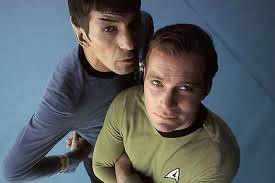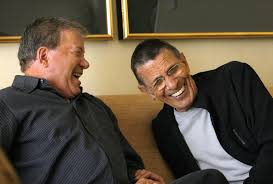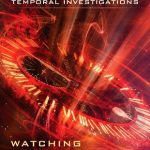 Leonard: My Fifty-Year Friendship with a Remarkable Man by William Shatner, David Fisher
Leonard: My Fifty-Year Friendship with a Remarkable Man by William Shatner, David Fisher Formats available: hardcover, paperback, ebook, audiobook
Pages: 278
Published by Thomas Dunne Books on February 16th 2016
Purchasing Info: Author's Website, Publisher's Website, Amazon, Barnes & Noble, Kobo, Bookshop.org
Goodreads
Leonard Nimoy and William Shatner first crossed paths as actors on the set of The Man from U.N.C.L.E. Little did they know that their next roles, in a new science-fiction television series, would shape their lives in ways no one could have anticipated. In seventy-nine television episodes and six feature films, they grew to know each other more than most friends could ever imagine.
Over the course of half a century, Shatner and Nimoy saw each other through personal and professional highs and lows. In this powerfully emotional book, Shatner tells the story of a man who was his friend for five decades, recounting anecdotes and untold stories of their lives on and off set, as well as gathering stories from others who knew Nimoy well, to present a full picture of a rich life.
As much a biography of Nimoy as a story of their friendship, Leonard is a uniquely heartfelt book written by one legendary actor in celebration of another.
My Review:
Yesterday was NASA’s Day of Remembrance, in honor of all those who lost their lives in the quest for space, particularly the tragic losses of Apollo I and the Space Shuttles Challenger and Columbia.
Because so many people have entered the space program and the aerospace industry because they fell in love with the idea of space travel while watching Star Trek, William Shatner’s semi-biographical, semi-autobiographical book about his friendship with the late and very much lamented Leonard Nimoy seemed like an appropriate book for this week.
 To this reader, it felt as if the book, while purporting to tell the story of Leonard Nimoy’s life, ends up combining autobiography with biography. These two men knew each other very well for a very long time, came from somewhat similar backgrounds, and found themselves yoked together, whether they liked it or not (and sometimes they did and sometimes they didn’t) by their performances in what everyone expected would be a short-lived TV program.
To this reader, it felt as if the book, while purporting to tell the story of Leonard Nimoy’s life, ends up combining autobiography with biography. These two men knew each other very well for a very long time, came from somewhat similar backgrounds, and found themselves yoked together, whether they liked it or not (and sometimes they did and sometimes they didn’t) by their performances in what everyone expected would be a short-lived TV program.
Instead, Star Trek became a phenomenon and none of the lives that it touched were ever the same. Particularly theirs.
Because Star Trek altered the trajectory of both their lives in ways that were both bizarre and profound, this book also serves as a personal recollection of the production of the original series. While many of these stories have been told before, it is still interesting to hear them again from someone who lived through those events.
A group which gets smaller and smaller every year. Dammit.
The other story that is told here is that of the life and occasionally hard times of a working actor in what is now considered the “Golden Age” of television. There is never a good time to be an actor. It’s a lot of tiny parts, short run work, and cab driving (in Nimoy’s case) or waiting tables or some other job that can be dropped and picked up on the whim of a casting director.
And even though these stories are now more than 50 years in the past, that struggle still resonates. The reader can see how those years formed the characters of the men who performed those iconic characters, and how much those characters both represented pieces of their core selves, and how much those characters influenced who they became.
For a fan, this is a fascinating story, all the more so because it rings so true in the author’s voice.
Escape Rating B+: Sometimes I talk about what I think about a book, sometimes I talk about what I feel. Fair warning, this is one of those “feelie” reviews.
I’ve been a Star Trek fan since the end of the original series. I watched some of those early episodes with my dad, so there are a lot of memories tied up in this for me. Also, the stories that Shatner tells at the very beginning of the book, about his and Nimoy’s shared background as first-generation Americans (or Canadians) in Jewish immigrant families is also the story of my parents’ generation. With very little alteration, my mother could tell similar stories.
As a fan, I read a lot of the “making of Star Trek” books that came out in the 1960s and 1970s. Many of the stories that Shatner relates were also a part of those books, but they are told slightly differently from one participant’s perspective than they were in those more “reporting style” books. Different both in the sense that we all remember things differently, and that it seems as if Shatner glosses over some of his behavior that drove his colleagues crazy at the time, and for years later. Some of the more contentious incidents seem to have faded from memory a bit.
We are all the stars of our own stories, possibly in this case more literally than for the rest of us.
This was a book where I both read the book in ebook, looked at the pictures in the hardcover, and listened to the audio. I would have the audio on in the car, and then pick up with the book at lunch and after I got home. One of the things that comes through on the audio is that the author often sounds tired. He frequently ran out of breath on the longer sentences. I kept wanting to tell him to take a breath in the middle, or grab a glass of water. I wanted to be there as he told his story.
 In the end, this is a book for the fans.It is way more about the history of Star Trek than any other single topic. As a fan, I found the story interesting and often charming. Perhaps I should say “fascinating” as Spock often did.
In the end, this is a book for the fans.It is way more about the history of Star Trek than any other single topic. As a fan, I found the story interesting and often charming. Perhaps I should say “fascinating” as Spock often did.
For readers who are not fans, or for later readers who are looking to find out what all the fuss was about, this is not a book that analyzes the influence of Star Trek or its characters on pop culture and the explosion of science fiction into movies, TV and mainstream literature. That’s a book for someone else at some other time.
But for those of us who loved those men and the show that they created, and which created them, this book is a marvelous way to remember them both.
As his most famous saying goes, Leonard Nimoy lived long and prospered. And he is missed.



















I wasn’t going to read this, but after your review, I think I will. I’m not into the whole fandom, so I’ve never read any of the books about the making of the original series, but I have very fond memories of watching it on our old RCA TV when I was a child. It definitely inspired my love of all things space related. We just watched the latest movie last week and it was a fun romp, although completely improbable (as always).
I know what you mean about the old RCA. When Star Trek went in syndication, I was in my teens. It was on at 2 am on Saturday night. I used to sneak the old portable TV up to my room and watch in secret, then take the TV back downstairs before I went to sleep. I was wrecked the next morning and didn’t care. I don’t think my parents ever figured it out.
Marlene Harris recently posted..Review: Leonard by William Shatner with David Fisher
I picked up the ebook on sale back in December and am looking forward to it. Eventually. (My TBR pile is so out of hand.)
I only saw one or two of the shows during the initial run despite much begging. It was on opposite something my dad liked (something in the vein of The FBI, Ironside, DRAGNET, etc–I don’t remember now) so I was pretty much always out of luck. It was so disappointing when the other kids talked about the show. 🙁 But thank goodness for syndication! Just a few years later it was on every day after school and I was able to watch to my heart’s content.